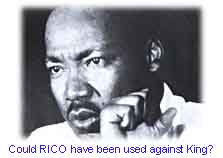|
|
Cal Thomas
 RICO's threat to free-speech and expression
RICO's threat to free-speech and expression
THE DECISION BY A federal jury in Chicago to invoke the Racketeer Influenced Corrupt Organization Act (RICO) and convict two pro-life groups and three pro-life leaders of extortion is a serious blow to the First Amendment and its traditional protection of protest and dissent.
The organizations and individuals convicted had aggressively promoted their views outside abortion clinics and, on occasion, turned away women seeking abortions. A 1994 law already bans the blocking of abortion clinics, and plaintiffs made clear their ultimate objective is to outlaw even demonstrations at places where abortions are performed.
If RICO had been around 40 years ago, businesses could have
sued Martin Luther King Jr. for sitting-in at lunch counters and
driving other customers away.  Chemical plants might have
sued the Berrigan brothers for their anti-war protests against
Dow Chemical, which made napalm used in bombs. Today,
shipping companies might sue Greenpeace for blocking their
ships, and even Disney could sue animal rights activists for
picketing a game park at Walt Disney World in Orlando, Fla.,
to protest a few animal deaths.
Chemical plants might have
sued the Berrigan brothers for their anti-war protests against
Dow Chemical, which made napalm used in bombs. Today,
shipping companies might sue Greenpeace for blocking their
ships, and even Disney could sue animal rights activists for
picketing a game park at Walt Disney World in Orlando, Fla.,
to protest a few animal deaths.
In this new decision, under RICO, damages can be trebled, and the class-action verdict allows the nation's 900 abortion clinics an opportunity to win "damages."
The morality of claiming the demonstrations "restrain trade" aside, this decision could come back to haunt those who invoked RICO in an attempt to silence all but the faintest of protests while their grisly work continues.
In The Right to Picket and the Freedom of Public Discourse, author John W. Whitehead writes of the 18th-century attorney, James Alexander, who correctly noted: "Freedom of speech is a principal pillar in a free government: when this support is taken away, the Constitution is dissolved, and tyranny is erected on its ruins." Throughout American history, protection of dissent has been vital to future freedoms.
James Madison, the "father" of the Constitution, while in his early 20s, was deeply impressed about the need to protect speech. A religious dissenter, Rev. Elijah Craig of the Blue Run Baptist Church, was imprisoned in Culpeper County, Virginia, for preaching. At the trial, the state's attorney of Virginia warned the court that Baptists "were like a bed of chamomile; the more they were trod, the more they would spread." Craig went to jail but continued to preach from his cell window. Later, he repeated his preaching in Orange, Va., where he was again imprisoned. This time, the young Madison was in the audience. Historians believe the experience helped frame Madison's opinion on the importance of unrestrained expression.
Thomas Paine's Common Sense, written in 1775, is a classic work about free expression. Later, with the Alien and Sedition Acts, President John Adams and the Federalists tried to eliminate political opposition by imprisoning opposition party leaders and writers. During the abolitionist movement beginning in the 1830s, every Southern state except Kentucky passed laws restricting the press, speech and even discussion of slavery. During the Civil War, free speech was often suspended.
In 1917, Congress passed the Espionage Act, and a sedition amendment was added the following year. The law was a response to the Bolshevik Revolution in Russia and prohibited any activities in opposition to World War I. These two laws were some of the most repressive legislation ever passed by the American government. The prohibitions included "uttering, printing, writing or publishing any disloyal, profane, scurrilous or abusive language, or language intended to cause contempt, scorn, contumely or disrepute as regards the form of the government of the United States ... of the Constitution ... or the flag ... or any language intended to incite resistance to the United States or promote the cause of its enemies."
In modern times, free speech and expression sustained the civil rights movement and ended an unpopular war. The First Amendment protects flag-burners, pornographers and rotten television and radio.
Now only protests against abortion are to be singled out for special penalties, though the author of RICO, University of Notre Dame Prof. G. Robert Blakely, said its sole intent was to curtail organized crime, not organized protest.
If the First Amendment doesn't protect all, it potentially
protects none. Should the pro-lifers not win on appeal, the
government will feel free to muzzle anyone or anything of
which it
4/21/98: Educating children v. preserving an institution
4/19/98: Analyzing the birth of a possible new nation
4/14/98: What's fair about our tax system?
4/10/98: CBS: 'Touched by a perv'
4/8/98: Judge Wright's wrong reasoning on sexual harassment
4/2/98: How about helping American cities before African?
3/31/98:Revenge of the children
3/29/98: The Clinton strategy: delay, deceive, deny, and destroy
3/26/98: Moralist Gary Hart
3/23/98: CNN's century of (liberal) women
3/17/98: Dandy Dan
3/15/98: An imposed 'settlement' settles nothing
3/13/98: David Brock's Turnabout